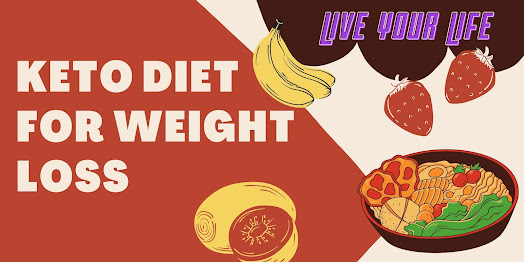keto diet for weight loss
Diet Review: Ketogenic Diet for Weight Loss
Do you wonder why there are so many advertisements promoting weight-loss strategies and diet plans? We're reviewing some popular diets and reviewing the research behind them in this series.
How does it work?
Ketogenic or "keto" diet is a low-carbohydrate, fat-rich diet that has been used for centuries to treat specific medical conditions. The ketogenic diet was commonly used to manage diabetes in the 19th century. In 1920, it was introduced as an effective treatment for epilepsy in children who were unresponsive to medication. The ketogenic diet has also been used in closely monitored settings for cancer, diabetes, polycystic ovarian syndrome, and Alzheimer's disease.
Despite this, the diet is gaining attention as a potential weight-loss strategy due to the low-carb diet craze, which started in the 1970s with the Atkins diet (a high-protein, low-carb diet that became a commercial success). Other low-carb diets today, including the Paleo, South Beach, and Dukan diets, are high in protein and moderate in fat. The ketogenic diet is distinguished by its exceptionally high-fat content, typically 70% to 80%, with only moderate protein intake.
Here's how it works
Ketogenic diets for weight loss work on the premise that when you take away glucose from the body, the main source of energy, which is obtained from carbohydrate foods, ketones are created from stored fat (hence, "keto"-genic). Due to its inability to store glucose, the brain requires the most glucose in a steady supply, about 120 grams daily. While fasting, or when very little carbohydrate is consumed, the body pulls glucose from the liver and temporarily breaks down muscle to release it. When this process continues for 3-4 days and stored glucose is fully depleted, the body's insulin levels drop and fat is used as its primary fuel. In the absence of glucose, the liver produces ketone bodies from fat.
Ketosis occurs when ketone bodies accumulate in the blood. A healthy individual may experience mild ketosis during periods of fasting (e.g., sleeping overnight) and strenuous exercise. If the ketogenic diet is followed carefully, blood levels of ketones should not reach harmful levels (known as "ketoacidosis") because the brain will use ketones as fuel, and healthy individuals typically produce enough insulin to prevent excessive ketones from forming. Why and when ketosis occurs and the amount of ketone bodies that accumulate in the body varies from person to person and depends on factors such as body fat percentage and resting metabolic rate.
Weight Loss Diet
There is no one "standard" ketogenic diet with a certain ratio of macronutrients (carbohydrates, protein, fat). The ketogenic diet restricts dietary carbohydrate intake to less than 50 grams a day, less than the amount found in a medium bagel, and can be as low as 20 grams. According to popular ketogenic resources, 70-80% of total calories should come from fat daily calories, Carbohydrates make up 5-10%, and protein makes up 10-20%. This translates to about 165 grams of fat, 40 grams of carbohydrates, and 75 grams of protein for a 2000-calorie diet. Protein intake on the ketogenic diet is moderate compared to other low-carb high-protein diets since too much protein can prevent ketosis. Since amino acids in protein can be converted to glucose, a ketogenic diet specifies enough protein to preserve lean body mass including muscle mass, but that will still cause ketosis.
Several ketogenic diets exist, but they all forbid carb-rich foods. Some of these foods may seem obvious: starches from both refined and whole grains like bread, cereal, pasta, rice, and cookies; potatoes, corn, and other starchy vegetables; and fruit juices. Beans, legumes, and most fruits are not so obvious. The majority of ketogenic diets allow foods high in saturated fat, such as fatty cuts of meat, processed meats, lard, and butter, as well as sources of unsaturated fat, including nuts, seeds, avocados, plant oils, and oily fish. It is possible for ketogenic food lists to differ and even conflict depending on your source of information.
What research has been done so far
Short-term metabolic changes have been shown to occur with the ketogenic diet. Health parameters associated with carrying excess weight have also improved, such as insulin resistance, high blood pressure, and elevated cholesterol and triglycerides. [2,7] Low-carbohydrate diets, including the ketogenic diet, are also being increasingly studied for the treatment of type 2 diabetes. Though not consistently demonstrated in research, there are several theories as to why the ketogenic diet promotes weight loss: [2,8,9]
Due to the high-fat content of the diet, this diet has a satiating effect and decreases food cravings. Reduced levels of appetite-stimulating hormones, such as insulin and ghrelin, after eating a low-carbohydrate diet. Ketone bodies-the body's main fuel source-reduce hunger directly.The metabolic effects of converting fat and protein into glucose increase calorie expenditure. Fat loss is promoted at the expense of lean body mass, partially due to decreased insulin levels.
Identifying potential pitfalls
Maintaining a very high-fat diet may be challenging. In addition to hunger, fatigue, low mood, irritability, constipation, headaches, and a state of mental fog may result from extreme carbohydrate restriction lasting days or weeks.” These uncomfortable feelings may subside, but staying satisfied with the limited variety of foods available may present new challenges, such as avoiding otherwise enjoyable foods such as a crunchy apple or creamy sweet potato.
Ketogenic diets may have some negative side effects, including increased risk of kidney stones and osteoporosis, as well as higher levels of uric acid in the blood (a risk factor for gout). Nutrient deficiencies may occur if the ketogenic diet does not include a variety of recommended foods. A daily variety of meats, fish, vegetables, fruits, nuts, and seeds can ensure adequate consumption of fiber, B vitamins, and minerals (iron, magnesium, zinc)-nutrients typically present in foods like whole grains but excluded from keto diets.
A registered dietitian may be able to create a ketogenic diet that minimizes nutrient deficiencies since whole food groups are excluded.

Comments
Post a Comment